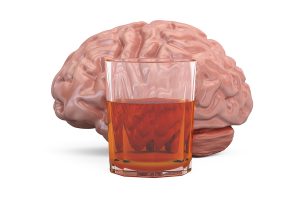New research has shown that there are brain changes even with moderate alcohol consumption. This article is based on a new study dated June 2017 from England. It has shown that there are brain changes even with moderate alcohol consumption.
Specifically, it is the hippocampus that atrophies under the influence of alcoholic drinks. This affects the use of language, memory and spatial orientation. Researchers used MRI scans to determine the hippocampus size of the individuals of the study. Research followed the patients over 30 years to study the effects of alcohol on the brain as follows:
Brain changes even with moderate alcohol consumption
Abstainers: No risk of hippocampal atrophy.
Light drinkers (1 to 7 drinks/week): no statistical difference from abstainers.
Moderate drinkers (14 to 21 drinks/week): 3.4-fold risk of hippocampal atrophy compared to abstainers.
Heavier drinkers (> 21 drinks/week): 5.8-fold risk of hippocampal atrophy compared to abstainers.
Other tests checking the loss of language fluidity (lexical fluency) over 30 years showed these findings:
Abstainers: 1.5% spontaneous reduction in lexical fluency over 30 years.
7 to 14 drinks/week: 14% reduction in lexical fluency over 30 years.
Moderate drinkers (14 to 21 drinks/week): 17% over 30 years.
Heavier drinkers (> 21 drinks/week): 16% over 30 years.
So far the consensus was that moderate drinking (1 glass of wine or beer per day for women and 2 glasses of wine or beer per day for men) would be healthy for the heart and also for the brain.But the results of this study deviate from this statement. Rather we now know that in civil workers in Great Britain the hippocampus has a risk of atrophy of 3.4-fold compared to abstainers. Language fluidity tests and other cognitive tests showed a 17% reduction over 30 years.
Other studies have shown that alcohol is not harmless when it comes to the risk of developing cancer. Oropharyngeal cancer, esophageal cancer and breast cancer in women have all been linked to consumption of moderate amounts of alcohol. On the other hand moderate alcohol consumption has been shown to reduce cardiovascular disease. There is an impressive reduction of 30% to 40% of diabetes with moderate alcohol intake.
Conclusion
In conclusion, not everything is clear when it comes to alcohol consumption. Subjectively it may make you feel better. But it seems that even smaller amounts of alcohol damage your hippocampus where memory and sex drive are located. These findings do not really come as a surprise, as alcohol is a nerve poison! Previously researchers thought that moderate drinking would be healthy for your heart. Yet, hippocampal atrophy and decline of cognitive function and language fluidity are objective evidence that alcohol is a brain toxin. Consequently moderate drinking is not that healthy. There likely will be more clinical trials to see whether this study can be verified by others.







